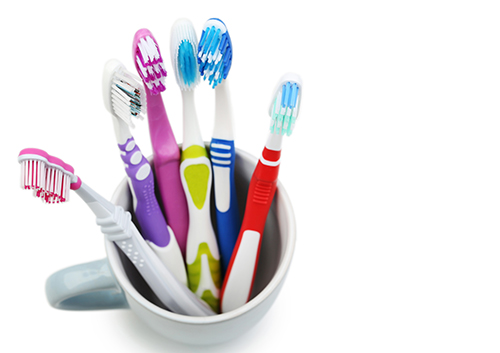Weighing the Facts about DIY Scaling
February 25th, 2026

The dental section of your local drugstore or favorite online site offers more dental tools for home care than ever before. Little angled mirrors. Tongue scrapers. Gum stimulators. Interproximal brushes. Why, there are even curettes and scalers to help you remove tartar at home.
But should you try do-it-yourself scaling (the technical term for scraping tartar off enamel) at home? Let’s weigh the facts.
- Tartar Buildup is Harmful
Plaque, a sticky biofilm composed of bacteria, food particles, saliva, and fluids, starts forming within hours after you brush. And within days, if it’s not brushed and flossed away, plaque starts to mineralize, becoming tartar, a hard, rough, yellow or brown deposit that you can’t simply brush away.
Tartar often develops in the places we where we don’t brush or floss effectively. If you run your tongue across the back of your front teeth and feel a rough surface, that might be tartar. If you check out the back of your mouth and discover yellow discoloration on your molars, that might be tartar. If you see brown staining between your teeth or at the gumline, that might be tartar.
Why worry about tartar, especially if it’s not visible? Several good reasons.
- Tartar provides a rough surface which makes it easier for plaque to stick to teeth, and more plaque leads to more cavities.
- Tartar irritates delicate gum tissue, which causes inflammation and gum disease. Not only can the gums themselves hurt, swell, or bleed, but they can begin to pull away from the teeth, creating pockets between tooth and gum. These deep pockets become home to harmful bacteria, making gums and the bone supporting your teeth more vulnerable to infection.
- When gum tissue recedes, the parts of your roots normally protected by that gum tissue are now exposed to bacteria and plaque. Because roots are coated with cementum, which is weaker than enamel, they are more vulnerable to cavities.
For all these reasons, cleaning tartar from your teeth is an essential part of every professional dental cleaning at our Dallas office.
- Your Dental Professional Is an Expert in Tartar Removal
Your dental team has extensive academic and clinical training which enable them to discover and remove any plaque or tartar thoroughly and effectively. They are also experts in using specialized tools to remove plaque and tartar gently and safely, including:
- Ultrasonic scalers, which use ultrasonic sound waves to break up tartar deposits.
- These metal hand tools have small, curved hooks on one or both ends, with sharp side edges and a pointed tip to fit between the teeth. They’re used to scrape away tartar above the gumline, and come in several angled shapes to accommodate the shape of different tooth surfaces.
- These tools look a lot like scalers and also come in a variety of shapes. The curette, though, can remove plaque above and below the gumline because its rounded tip and back are gentler around delicate root surfaces and gum pockets.
The scalers available at your drugstore certainly look a lot like these professional tools. But,
- Should You Try This at Home?
There are many DIY home projects which are satisfying and well worth your time—but DIY dental scaling isn’t one of them. Let’s take a look at some of the dangers of home scaling.
- Ineffective cleaning. Without removing tartar completely from around and under the gums, you’re more likely to suffer gum disease and cavities below the gumline.
- Your enamel is hard, but it’s not indestructible! A bit too much force, and you can scratch and damage tooth surfaces. And, if you’ve ever flossed a little too vigorously, you know how delicate your gum tissue is. The sharp ends of scaling tools can cause gum injuries, mouth injuries, and tongue injuries. Which brings us to . . .
- There’s not only the danger of infection due to cuts and lacerations, but you can accidentally push plaque and tartar into and under gum tissue, leading to irritation and infection.
- Finally, imagine using a sharp tool to scrape tartar from the back of your teeth, around your delicate gum area, and in pockets below the gum surface, using a tiny backwards mirror image to guide you in the dark interior of your mouth. There’s no way to make this sound like a good idea!
So, on balance, should you do your own scaling? We think the answer is clear. Keep your teeth healthy and plaque-free at home with regular brushing and flossing, and see Drs. Sheena Allen, Mark Margolin, and Moein Sadrkhani when it’s time for a cleaning. When you need tartar removal that’s safe, precise, and thorough, the experience and skill of your dental team outweigh any potential DIY satisfaction!


